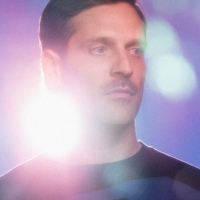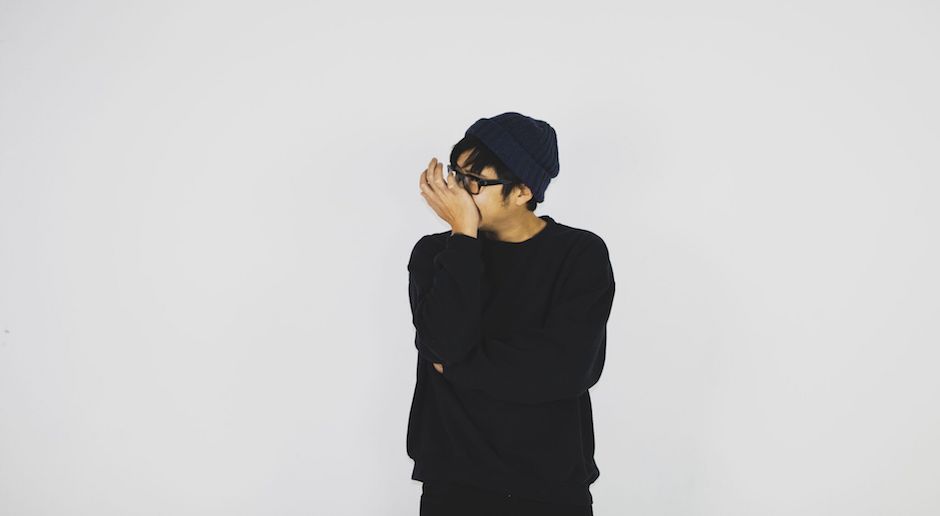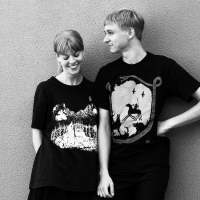 Australian funk king Touch Sensitive drops the second single from his upcoming album, No Other HighVisions, Touch Sensitive's debut album, is set to arrive via Future Classic on September 15.
Australian funk king Touch Sensitive drops the second single from his upcoming album, No Other HighVisions, Touch Sensitive's debut album, is set to arrive via Future Classic on September 15.

Yeo's Desire Path proves that the future of Australian electronic is bright
We chat to the seasoned Melbourne musician about his new album, staying independent and navigating the Australian music scene as an Asian-Australian.
With a career dating back to 2006, Melbourne's Yeo Choong has become a staple of the Australian electronic scene, albiet an under-rated one. Under the Yeo alias, Choong has since released a bounty of albums and singles and has toured the country numerous times, performing at some of the country's biggest and best festivals along the way, including Splendour In The Grass and Beyond The Valley. After last year's acclaimed Ganbaru threw him into the limelight, 2017 sees Yeo dive into his biggest release yet - Desire Path. Boasting collaborations with Asta, Fractures, Kira Puru and more, Desire Path is Yeo's most accessible record yet, with the guest-heavy affair drawing from a wide array of sounds and styles from the dancehall-tinged, confident Asta collaboration Never Wanted That to the upbeat, house-flavoured number Chasing Shadows.
Despite the accessibility, it's also one of Yeo's most personal releases, with the musician digging into his own private life to draw influence for much of the album's themes. "This is a record I've made with friends, for my friends, while in search of friend," he says. "There are stories about being totally fine with the friend-zone, dumb social media habits, falling for a mate's crush, assholes trying to take your money, boring bands that get famous, and losing a close pal to terminal illness”. When joined with the raw, natural feel that comes with the album being recorded in his own studio shed, these stories and messages are what makes Desire Path such a satisfying and relatable record - there's only so much relatability in a song about love written by ten songwriters in a million dollar studio.
Cementing Yeo's name as one of Australia's best producers, Desire Path is an album worth sitting down and basking in with little distraction, and with so many sounds spread across the album's ten tracks, we can almost guarntee there's at least one song in there for everyone. To celebrate the album's release and his forthcoming album tour (with Lonelyspeck and an army of special local acts on support - dates at the bottom of this article), we got to know the producer and his sixth album a little better, while also discussing his choice to stay independent in a scene saturated with labels, and how he navigates the said scene as an Asian-Australian.
First of all, I think a massive congratulations is in order for the release of Desire Path. Are you feeling much more confident this time around in comparison to how you were feeling leading up to the release of Ganbaru?
Thank you! To be honest, I’m just as nervous this time for slightly different reasons. To me, this album is more experimental than the last. The record itself is collaboration heavy, which is a first, and I’m not a trusting person when it comes to music. Our PR campaign has been rebellious to say the least, and deliberately so to align with our insurgent release plan. I’ve sunk more capital into this project than ever before. Taking all of the above into account, I’d say I’m releasing Desire Path at my own highest personal risk.
How have you evolved as a musician and artist since the release of Ganbaru? Has there been any differences between the creation of Ganbaru and Desire Path?
A few people have said that my sound has grown more confident. I feel like that is something to be noticed by people other than myself. I’m definitely a better producer, though that’s expected since I’m learning and experimenting all the time with new techniques. I had Desire Path mixed by another engineer, whereas I mixed Ganbaru myself. Otherwise, all the normal evolutions have taken place - my influences, worldview and writing style have all shifted a year forward since the release of Ganbaru.
A really notable difference between Desire Path and Ganbaru is the amount of collaborations. What opened you up to collaborating with more artists for the record? What advantages do you personally see in collaborating?
I guess it was a desire to explore something different. I never want to make the same record twice. I’ve always been in other projects but hardly ever invited anyone to work on something that actually belonged to me. For some reason, I never felt like anyone would want to. Through collaborating on this record, I’ve witnessed the textbook result: when a musician creates with another, it’s unique and unlike what they’d achieve on their own. By far, I think biggest advantage to collaborating is getting to know your collaborators. I mean this in both a how-do-they-tick way and also in a we-are-now-better-friends-
Another thing that’s noticeable on Desire Path is the amount of different sounds you take on. Never Wanted That has this summery dancehall vibe to it, while some of the other tracks on the album take on more housey (Chasing Shadows) or traditional indie sounds (He Ain’t I). Is there a particular reason why you’re choosing not to stick with just one sound across the album?
I hope it’s something you enjoyed, because I’ve always been like this and I’d be bored as bat-shit if I weren’t. Desire Path is my sixth album. To give further context, my third album was a country-folk album. There were reggae jams and acoustic ballads on my very first album. Like all musicians, my taste varies, and I don’t limit that to what I consume. It applies to what I create too. I’m allowing my creative metabolism to operate naturally at a higher rate than what’s expected by the general public, to the chagrin of money-hungry A&R teams across the world. Don’t @ me.
One of my favourite tracks on the album is @snackswithyeo, which highlights your love-hate relationship with social media. Do you have any complaints about working in a field which is so heavily based on social media and marketing? Some artists nowadays have completely built careers off their social pages.
Haha! My only true complaint is that I get sucked in too easily. Yeah sure, an online profile is a curated, two-dimensional portrayal of a person, but it works. I scroll for hours! I deleted my personal Facebook profile 6 years ago because I was stalking too much, but my demons are back in the form of Twitter and Instagram. Social media is one of the most effective promotional tools of this decade, and artists with real talent who capitalise on their reach truly deserve a successful career. However, I relish the imminent obscurity of dilettantes sporting nothing but a DSLR, good looks and several thousand perverted followers.
Aside from social media, how would you sum up the overall themes of the album?
It’s a vulnerable experience. You’ll hear me dragging dumbasses alongside famous Australian bands that are rich, white and boring. Hearts get broken. Friendships blossom under a romantic triangular shade-sail. I stalk people on the Internet. There’s a song about the death of a close friend. There’s a dark side and a light side, and it’s always playful, with dollops of sarcasm and sincerity in equal amounts.
I really enjoyed an interview you did recently about being an Asian-Australian in the music industry - how do you navigate the music industry as a person of colour, and do you have any advice for any other musicians of colour looking to get into music but off-put by the lack of non-white industry figures?
Thanks so much for reading that interview and being brave enough to engage on the topic. The Australian music industry can be plain stupid, so I’ve been fine-tuning my dumbness radar. My approach is to learn as much possible, form my own opinion, stick to it aggressively and apologise when proven wrong. If you’re not white and looking to get into music, please don’t be afraid, because the people of colour currently working in the industry actually need your presence and will support you. It won’t be easy, but the sooner we’re visible, the closer to equality we’ll get. I recommend pursuing knowledge first and foremost, and you can do so by plugging into your online network, engaging in conversation, and playing that damned race card when it’s valid. Embrace your heritage even if you feel a cultural distance from it and do your best to identify the conditioning sponsored by a long history of white supremacy.
It seems that in the past year or so, there has been far more attention to highlighting and promoting minorities not just in the music industry, but as a whole. Do you think things are improving for people of colour in music?
It’s noticeable progress, but we’re globally behind. The baggage we’re carrying may be getting lighter but its contents are still filthy. I see way more noise than I see action and change. People here who aren’t brainwashed to favour white men still favour white women, even though white women don’t need representation as badly as women of colour. I don’t know how to fix everything, but I do think that to make a start, every person regardless of skin colour needs to grow up, take ownership of their fragility and weird messed-up history, agree to change the fucking date, say sorry when they get called out, have a solid go at blundering through several long-term friendships with people that aren’t white (who are easy to find by the way, because we’re everywhere and we’ve been everywhere thanks to being pushed around), and then promote these non-white friends to positions of power to perpetuate fair representation. Do it naturally though ay, ‘cause otherwise it's tokenism. Last but not least, teach it to your kids.
You’re still an independent artist, with a single person managing your management and PR plus another managing your bookings. At this point in your career, why have you kept your team small? Are you not enticed by offers from labels?
Offers indeed! Quite frankly, we don’t get any. I’m glad we don’t get any because I’m a control freak. I protect my creative freedom too fiercely for labels to be involved. I’ve released a few times through labels. Sometimes it has worked, and sometimes it hasn’t. Someone somewhere on the label team has final say on the creative process and I personally struggle with making artistic choices in pursuit of sales. I don’t think this situation will change for me unless I start making serious bank independently. Still, I know heaps of nice people that work at labels, even at majors. Keeping my team lean and mean gives me flexibility to do what I want and to do it quickly, because I don’t have to go through a stupid email chain of command. A small team also costs less.
Tour Dates:

Follow Yeo: FACEBOOK
 Australian funk king Touch Sensitive drops the second single from his upcoming album, No Other HighVisions, Touch Sensitive's debut album, is set to arrive via Future Classic on September 15.
Australian funk king Touch Sensitive drops the second single from his upcoming album, No Other HighVisions, Touch Sensitive's debut album, is set to arrive via Future Classic on September 15.
 Premiere: Listen to an intricate, engrossing new single from Hemm - Angel MindThe Melbourne duo continue to tease an excellent-sounding new EP.
Premiere: Listen to an intricate, engrossing new single from Hemm - Angel MindThe Melbourne duo continue to tease an excellent-sounding new EP.